Carl Lewis interview: “I was always a long jumper who could run”
The ‘Son of the Wind,’ a nine-time Olympic gold medalist, spoke to AS at Metafuturo and addresses an ongoing issue: “I’ve experienced racism since I was young.”

At 63 years old, Carl Lewis cuts an imposing figure. His suit fits like a glove, and his smile is as big as ever. Frederick Carlton Lewis (Birmingham, Alabama) sat down with AS after delivering a masterclass at the opening of Metafuturo 2024, a symposium organized by Atresmedia at the Ateneo de Madrid. The ‘Son of the Wind’ is a legend in the world of sport with ten Olympic medals (nine golds and one silver) and ten World Championship medals (eight golds, one silver, and one bronze). Cordial, expressive, and talkative, he answers every question we have for him with ease.
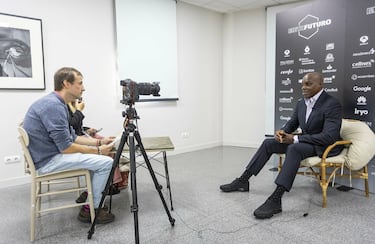
-Last week, you surprised many by singing undercover as a panda on the show The Masked Singer. What was that experience like?
-To be honest, it was a lot of fun. I had an incredible time. What really amazed me was that there were no leaks about it because we filmed it a few months ago. It was such a great experience. I hadn’t been in a studio in years, probably 20 at least, so it was really fun to be part of a big production again.
-You were an idol in athletics, something we don’t see much of these days. Why don’t athletes combine sprinting and jumping anymore?
-I find it disappointing too, to be honest. But if someone wants to compete in both sprinting and long jump, they need to start as a jumper because that’s the harder event. Most of today’s athletes don’t see the long jump as being as important as sprinting, so they don’t even try. In my opinion, long jump is much more challenging, and these guys just aren’t interested or willing to work as hard to master it the way we used to.
“The long jump is a more difficult event. It’s disappointing that there are no athletes doing both anymore. Today’s athletes aren’t interested, and they don’t have the desire to work as hard.”
Different disciplines
-Were you a long jumper who could run faster than anyone, or a sprinter who could jump better than anyone else?
-I was always a long jumper. I was a long jumper who could run. If I had to give up all the events except one, I’d keep the long jump. That’s where I worked the hardest because I was always competing against myself. I think that’s how you really improve before you start measuring yourself against the best in the world. One of the keys to success is believing in yourself.
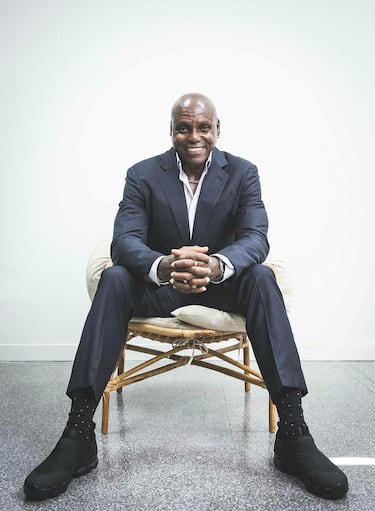
-In Los Angeles 1984, you matched Jesse Owens’ feat of winning four gold medals at a single Olympics, like he did in Berlin 1936. What do you remember most fondly from that achievement?
-That’s easy. When I finished the 100 meters, I was overwhelmed because I wasn’t sure I could win it. You know, that gold was tough to get. Then, taking the victory lap around the stadium and seeing my parents in the stands, beaming with pride. Without a doubt, that was the most special moment of those Games.
-The Olympics will return to Los Angeles in four years. Your name has come up as a possible final torchbearer to light the cauldron. Would that excite you?
-I’m thrilled that the Olympics are coming back to Los Angeles, and who knows if I’ll be chosen. I know L.A. is going to do an amazing job. Paris was phenomenal, and I can’t wait for 2028. I’m also working with athletes, and I’ll have athletes I’m representing and helping at those Games. That changes my perspective. You go from being an athlete to being a coach, a mentor, at the Olympics. There are so many layers to this: returning to the Games, going back to the Memorial Coliseum, and working with athletes.
-At the 1991 World Championships in Tokyo, you were in a long jump final with four attempts over 8.80 meters (28 ft 10.46 in) (two of them disqualified due to wind assistance by 0.3 and 0.9 m/s). It’s considered the best long jump competition ever, even though you had to settle for silver. Could it be the most unjust defeat in sports history?
-(Laughs). It really could be. I wouldn’t call it unjust though... more like the best defeat ever. It’s interesting to point out that three of the top five long jumps in history happened in that competition. Two of them were mine, by the way (laughs). There’s never been a competition of that quality in any other event.
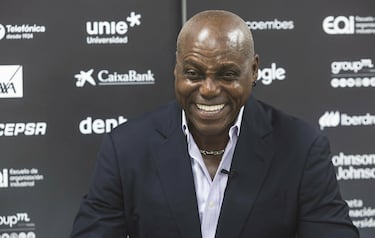
-That day, Mike Powell broke the world record with a jump of 8.95 meters (29 ft 4.36 in), which still stands more than 30 years later, just like the records in high jump and triple jump. What made the jumpers of the ‘80s and ‘90s so special?
-When I reached the elite level, I wanted to jump far. I worked and trained really hard. I started jumping 8.60, 8.70, 8.80... and everyone else followed suit. We pushed each other. The same thing happened in high jump and triple jump. In long jump, when Mike Powell, Larry Myricks, and I all retired around the same time, no one really stepped in to fill the void. Pedroso came close, but not quite. Dwight Phillips was the last one connected to what we were doing. Since then, the level has been really low.
You’re a global sports icon, but you’ve also spoken out about experiencing racism. You’ve even said that it might have cost you a jump over 9 meters that video footage suggests you achieved at the 1982 Trials.
-I need to clarify something. That jump wasn’t about racism. Race wasn’t involved. It was about an incompetent and stubborn official. That being said, I’ve experienced racism since I was young. Sports reflect society, and society had and still has racial issues, which affect Black people. Some people want to hold on to privileges they’ve had for years, and until society decides it’s time to end that, we’ll keep facing racial problems. People like former President Donald Trump have made things worse. He’s fed into it and emboldened people to be more openly racist. In many parts of the world, it seems accepted, but in a couple of weeks, we’ll deal with it at the election.
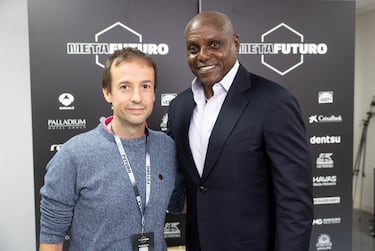
-What do you think will happen in the election, given your understanding of the U.S.?
-There are two issues. First, the frustration that our country could elect a convicted criminal guilty of, among other things, sexual abuse. But on the other hand, there’s a lot of excitement and hope around Kamala Harris and Tim Walz. I think they’ll get it done, and I see a lot of support for them. I’m excited about the future of their presidency. If Kamala becomes president, the world will be a better place than it is now—definitely better than with Trump. It’s a huge opportunity.
“It’s frustrating that a convicted criminal guilty of sexual abuse against a woman could be elected.”
The Presidential elections
-World Athletics seems determined to get rid of the takeoff board in long jump and triple jump, replacing it with a jump zone. You hold six of the nine best jumps in history. What do you think about that?
-I don’t think they’ll achieve what they’re aiming for. There won’t be fewer fouls like they expect. Honestly, I think the main reason is that they don’t believe anyone can beat Mike Powell’s record, so they want to reset things. It’s an insult to the jumpers, and I think they should speak out and say, ‘If you change this, we won’t jump because you’re telling us we’re not good enough.’ But since they’re not doing that, it’s easy to change the rules. Now, it’s up to the athletes. Plus, there are very few places that can implement this. It won’t work in high schools, universities, or many countries. So, when will they do it? Only at World Championships and the Olympics? It’s going to be very tough to put into practice.
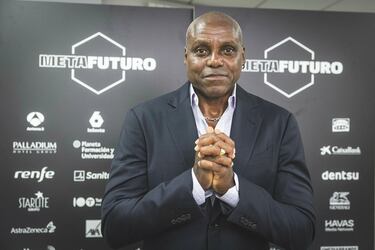
-What’s your opinion on the current state of the long jump?
-I don’t follow it much, but it’s disappointing to see the level being so low now. Unfortunately, I don’t see that changing. It’s competitive, but the standard is low.
The long jump is competitive, but the standard is low
Opinion on the state of the long jump
-One last question: if you had to name the best moments of your career, what would they be?
Related stories
-The first, without a doubt, is winning long jump gold in Atlanta 1996. That victory lap. Everything stopped to honor me. I was 35 years old, which is considered old, but I felt good, and even though I didn’t have the same confidence, I succeeded. I went into that event with eight gold medals already, and I knew that if I lost, I’d only be judged by that one result. It taught me that resilience is key: focusing and seeing yourself succeeding in the future. That’s the most memorable highlight of my career. I also hold a special place for the feeling I had when, at 17, I was selected by Team USA for the 1980 Moscow Games, which we didn’t attend because of the boycott. And of course, the Barcelona Olympics. Spain holds a special place in my heart; those Games were the most beautiful of the four I competed in.
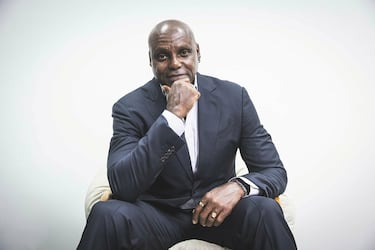
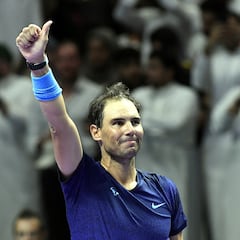

Complete your personal details to comment